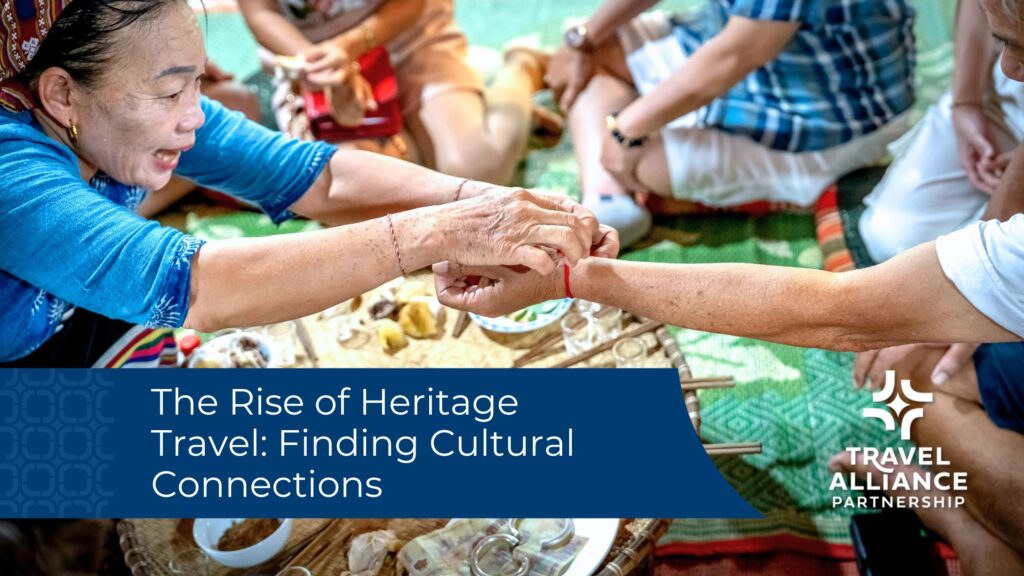The Rise of Heritage Travel: Finding Cultural Connections
People often say they are traveling to “find themselves,” and heritage travel is quickly becoming one of the most meaningful ways for travelers to explore the world. It goes beyond ticking famous landmarks off a list—this wave of interest is about finding cultural connections, uncovering stories, and walking in the footsteps of one’s ancestors.
For destinations, this trend opens up unique opportunities to attract visitors. Whether inspired by DNA testing or historical curiosity, heritage travel has immense potential to deepen tourism’s appeal and create unforgettable tours that resonate emotionally with visitors.

Understanding the Roots of Heritage Travel
The Role of DNA Testing in Heritage Travel
The home DNA test trend kicked off in the 2010s and played a major role in fueling interest in heritage travel. Companies like AncestryDNA and 23andMe allow people to uncover their family history, and can provide in-depth information about where their ancestors lived, and what their lives were like. These discoveries spark curiosity and interest in finding personal connections in specific destinations.
For destinations, there’s a clear message here—travelers want to go beyond the surface. They’re seeking trips that not only reveal the beauty of an area but also give them a sense of identity and history. Promoting genealogy tours, historical archives, and partnerships with ancestry research companies could be a powerful strategy to engage this audience.
Historical Events as Catalysts for Heritage Travel
Historical milestones frequently inspire travel. Significant anniversaries—for example, the 75th anniversary of the end of World War II—often prompt descendants of those affected to visit ancestral homelands. Destinations that tie into these historical moments can gain a unique promotional edge.
For instance, Poland has embraced its role in WWII history by hosting a growing number of Jewish heritage tours and Holocaust memorial site visits. For destinations tied to major historic events, offering guided tours and well-researched content can create a strong draw for travelers looking for a deeper cultural experience.
Examples of Heritage Travel
Heritage travel offers a unique opportunity to connect with the past and explore the cultural threads that shape our identities. Around the world, travelers are seeking out destinations that allow them to immerse themselves in their ancestral stories. For example, Irish Americans often visit Ireland to trace their family roots – it’s common enough that The Shelbourne hotel in Dublin actually employs a genealogy butler! Similarly, Italian Americans may explore their heritage through culinary tours in Tuscany or Sicily. Jewish heritage tours often include visits to historical sites in Eastern Europe, such as synagogues and Holocaust memorials.
One particularly inspiring example of heritage travel is the rise of Black History travel, which not only connects individuals to their roots but also amplifies the stories and contributions of the African diaspora. Let’s take a closer look at this growing movement.
Black History Travel in Latin America
Black History travel has gained significant momentum in recent years. Eileen Ivette, a recent guest on the Destination on the Left podcast, is the founder of Black Latin History and one of the leading voices in this space, using her platform to illuminate Black history and culture across Latin America.
Eileen’s work highlights destinations like San Basilio de Palenque in Colombia, the first free Black town in the Americas, where visitors can learn about the town’s history and its role in the fight for freedom. In Brazil, travelers can take Afro Rio immersion tours to explore the Black roots of samba and Carnival, traditions that were once outlawed but are now celebrated as cultural cornerstones.
Through her storytelling, Eileen emphasizes the importance of supporting Black-owned businesses and engaging with local communities. For instance, her travel series on Cartagena, Colombia, not only showcases historical sites but also features Black-owned restaurants and cultural experiences like champeta dance classes. This approach allows travelers to connect with history while contributing to the economic growth of underrepresented communities.
Leveraging Cultural Immersion to Attract Visitors
Creating Authentic Experiences
One of the most effective ways to appeal to heritage travelers is by offering immersive experiences that connect visitors to local culture. People want to engage with traditions and learn about the stories that define a place.
Consider the success of champeta dance classes in Cartagena or Afro-Brazilian music tours in Salvador. These curated experiences invite travelers to step into history and interact with cultural expressions in a meaningful, memorable way. Destinations can craft similar activities that reflect local traditions while offering hands-on opportunities for visitors to participate.
Storytelling as a Marketing Tool
Heritage travel thrives on storytelling. Emotional, personal narratives connect travelers deeply to a place and leave a lasting impression long after the trip is over. Destinations can leverage storytelling by featuring local historians, community leaders, and even descendants of key cultural figures in their content. Personalized accounts and unique visuals bring history to life, allowing marketing campaigns to build authentic connections with potential travelers.
Embracing Heritage Travel
Heritage travel presents a unique opportunity for destinations to appeal to travelers who want more than a vacation—they want a connection. By offering culturally immersive experiences, promoting authentic stories, and collaborating with local communities, destinations can solidify their place in the rapidly growing heritage travel market. Now is the time to craft stories, create connections, and welcome travelers eager to discover the narratives that define them.
Author
Related Posts
Welcoming All 2.0: Key Takeaways from Our Community Conversation on Inclusion in Tourism
In our rapidly evolving travel industry, the concept of being a “welcoming destination” is no longer simply about inviting more visitors. It’s about deeply understanding…
10 Must-Listen Podcasts for Travel, Tourism & Hospitality Professionals
I’ve had the joy of hosting Destination on the Left—an award-winning podcast spotlighting the travel, tourism, and hospitality industry—since 2016. My team and I believe…
